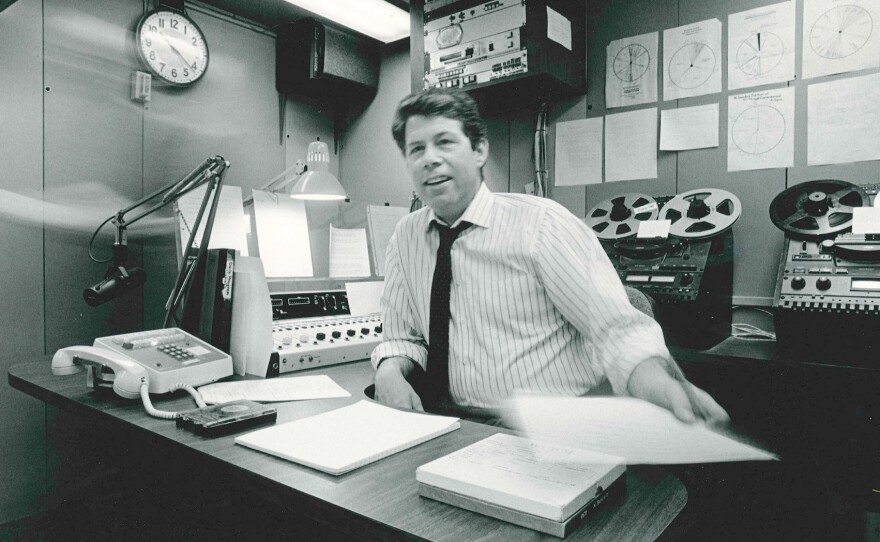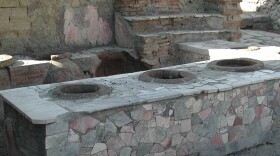WUWM went on the air on this day in 1964. As we celebrate our 55th birthday, we're also celebrating and looking back on the staff members who were integral to the station's content and identity.
For anyone who listened to WUWM from the early '90s until just a few years ago, Bob Bach is a familiar voice. He worked in WUWM’s newsroom from 1991 to 2015. In those 24 years, he reported on the news, hosted the precursor to Lake Effect (called At10), and finished up his career as our local Morning Edition host and anchor.
READ: WUWM's First GM Reflects On The Station's Rich History
It's been five years since he retired, but Bach recalls that first working at WUWM really required him to learn on the job. His previous experience was as a disc jockey in 1975 in Merrill, Wis., and then as a news and sports reporter for WISN in Milwaukee. He also spent some time as a sports reporter on Channel 18 before diving into the world of long-form journalism.
"News reporting that I encountered here was different from the stand point that it was not just 'wham, bam, 30 seconds.' It was longer form material that required additional voices and really was a fascinating learn on the job situation that I really enjoyed," says Bach.
By the mid-'90s, he says he truly developed a sense of what stories needed to be told and what would work on the air.

"Once that began to fall into place it just seemed like the whole landscape of ideas opened up because there was so many possibilities — including environmental reporting, which became a complete fascination of mine and in some ways changed my life early on," notes Bach.
One major component that's evolved in Bach's radio career is the technology used in producing content. Everything was recorded on a quarter-inch magnetic tape, and there was a skill in being able to cut tape and splice it together without making any noises in playback.
"Now with electronic editing and computerized editing, that skill is a wonderful memory — and it's absolutely useless," Bach jokes.
In some ways there has not been a change in term of how content is presented, says Bach. It's still largely a long-form style of journalism, but in his early years WUWM did more documentaries that could run up to 30 minutes and there was no public affairs interview problem.

One thing Bach is grateful for is the influence the Internet has had on public radio.
"Back then there was no Internet, so stories that aired basically went into the ether and disappeared," he notes. "The Internet has changed so much of how we distribute information, store information, make it available world-wide that it's almost inconceivable to think of a time when it did not exist."
When Bach began hosting Lake Effect's precursor, At10, he found interviewing to be vastly different from the pressure of creating a four-minute news story.
"The idea is: let's get to the truth and stay there and present as much information as we can."
"It was easier to do interviews than it was to do long-form stories because you didn't have the same element of compression," he notes.
Bach learned to ask the best questions up front and that every mission of each interview was to challenge the guest. And if you are going to challenge the guest in a constructive way, the interviewer needs to know their stuff.
"The idea is: let's get to the truth and stay there and present as much information as we can in the allotted time and that'll be a service to our listeners," says Bach. "We're not going to waste anybody's time."
In the nearly 25 years at WUWM, Bach says the Milwaukee news landscape radically changed with the corporatization of AM radio in the late 1980s.
"[Stations] found that it was far less expensive to provide confrontational talk between a host and listeners with a call scanner than it was with a full-blown news department," he says.

During the same time, there was a proliferation of music on the FM band and the recision of The Fairness Doctrine — it required that any person who would be spoken of would have an equal opportunity to respond and that a radio station needed to provide a certain quality of content in the public interest.
"Once it was removed, it was kind of open season on raw opinion that would go unchallenged," says Bach.
However, these things also lead to public radio filling in the gap. "To this day, public radio, and WUWM in particular — it's a beacon," says Bach. "I mean, if you have a yearning to hear the real deal, this is where you want to listen."
"To this day, public radio, and WUWM in particular — it's a beacon."
He's thankful public radio exists.
"Thank goodness that we do have somewhere where we can tune in every single day to get a dose of sanity and to get a dose of accuracy and objectivity," he says. "Because, especially now, these things are absolute requirements to good mental health."

While Bach admits he does miss producing stories in his retirement, he certainly doesn't miss the deadline pressure.
"I think the greatest fear that I had in producing hard news stories was answering this question: 'Does this story end where it really should have begun?' That was just a nightmare," he says.
Even if it where the story ends was a constant question for Bach, WUWM is grateful for all of the work he did and stories he's shared at the station.










